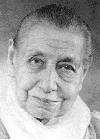
The Mother commented this text on
28 December 1950 |
The Mother
Correct Judgment
(November 1949)
Read the original in French:
Un jugement correct
One of the great problems in sports competitions is equity of judgment.
To avoid the clashes and quarrels which would otherwise be inevitable,
it has been decided once and for all that the competitors would submit
without argument to the judges' decision. This may solve the problem for
those who are being judged, but not for those who judge; for, if they
are sincere, the more trust they are shown, the more care they should
take to be absolutely correct in their judgments. That is why, to begin
with, I eliminate all the cases in which the judgment is made beforehand,
so to say, for reasons of policy or for any other reason. For although
unfortunately this happens all too often, everyone agrees that it is vile
and that human dignity demands that it should not be done.
As a rule, everything is thought to be all right when judgments are based
on a thorough technical knowledge and on a sufficient degree of impartiality.
These judgments rely on sense-perception, which is normally considered
incontrovertible. In fact, however, this mode of perception is in itself
uncertain. The sense-organs are directly under the influence of the psychological
state of the individual who uses them, and thus the sense-perceptions
are altered, falsified, distorted in one way or another by the perceiver's
feelings towards the thing perceived.
For example, those who belong to a group or an association are either
too lenient or unduly severe towards the members of this group. From the
point of view of truth, neither leniency nor severity is worth more than
the other, for in both cases the judgment is based on a feeling and not
on the objective and disinterested perception of the facts. This is a
very obvious case, but even without going to this extreme, no human being,
unless he is a Yogin, is free from these attractions and repulsions, which
are rarely perceived by the active consciousness, but which nonetheless
exert a great influence on the functioning of the senses.
Only one who is above all likes and dislikes, all desires and preferences,
can regard all things with perfect impartiality; the purely objective
perception of his senses becomes like that of an extremely delicate and
faultless mechanism which benefits from the light of a living consciousness.
Here too yogic discipline will come to our aid by helping us to build
characters of such nobility that they can become instruments of the truth.
The Mother
in "Bulletin", November 1949
and in CWM, volume 12 "Education", pages
265-266
published by Sri
Aurobindo Ashram - Pondicherry
diffusion by SABDA
The Mother commented this
text on 28 December 1950
|
